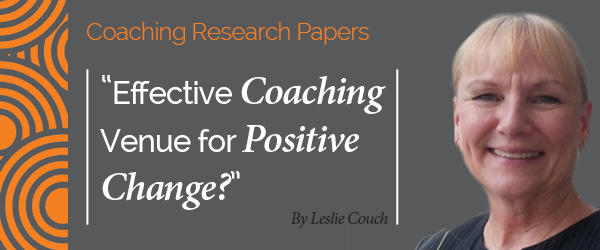
(Business Coach, UNITED STATES)
Introduction
The intent of this paper is to explore the retreat setting as an effective venue for individual coaching. The focus here is not on the actual location of the coaching. Clients and coaches come together successfully in a variety of ways such as private offices, business or class meeting rooms, or virtually (i.e. telephone, or web-based communication). Each of these venues allows for an unlimited amount of coaching sessions. Retreats by their nature, however, compact the amount of time spent in the coaching environment, decreasing the length of exposure to coach and client while increasing the intensity of the sessions themselves. The question is whether this short, intense duration negatively or positively affects the individual’s ability to achieve a meaningful and long lasting coaching experience.
When defining the intent and purpose of coaching, two basic premises emerge:
- that it is an ongoing relationship between coach and client, and
- that the client’s participation is a key element in the coaching process.
In other words, coaching is partnership-oriented and client-directed. Coaching engagements vary greatly from a few periodic sessions to many sessions spanning a year or more depending on the nature of the coaching and the need of the client. Although the length of time varies, it is widely accepted that positive results generally do not happen overnight or within one session with the client. Since sessions are periodic and multiple in nature, much of the positive change for a client occurs when the client applies new thought and behavior methods to the client’s activities outside of the coaching environment. How effective, then, can a retreat lasting a few days be in helping the client achieve their goals and create positive, long lasting change?
During the research process, it was discovered that there is ample support for the success of corporate and executive retreats, but no data was readily available on the efficacy of retreats for individuals in achieving their expectations of successful coaching. In order to draw a conclusion then, this paper examines the concepts of coaching, the coaching process, the group versus the individual coaching approach, and coaching in the retreat environment to determine whether retreats may be an effective component of the coaching process.
What is coaching?
In order to discern whether retreats are effective coaching venues, it is first necessary to understand the concept and purpose of coaching. Since coaching is still considered a new profession, and therefore not regulated, the industry has taken it upon itself to self-regulate through professional organizations that set competency guidelines and ethical standards for both trainers and coaches. For this paper, the definitive organization used to understand the coaching profession is the International Coach Federation, or ICF (www.coachfederation.com).
The International Coaching Federation defines coaching as
…an ongoing partnership designed to help clients produce fulfilling results in their personal and professional lives.
(www.coachfederation.com/find-a-coach/what-is-coaching). To further illustrate a common theme in clarifying what coaching is all about, another professional coaching organization, the International Institute of Coaching is cited here as well. The IIC states that